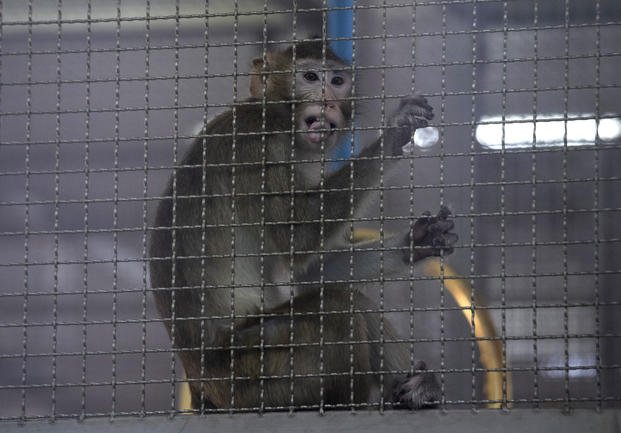
The Department of Veterans Affairs will end its spinal cord research involving monkeys this month, with the conclusion of studies on stem cell therapy to treat injuries and understand the impact of bruising on spinal cords.
The completion wraps up decades of VA research using primates to study a host of medical conditions and treatments, coming at the end of a long effort by activists and lawmakers to halt studies that harm dogs, cats and primates.
In a February update to Congress obtained by the animal rights group White Coat Waste Project, VA officials said the two primate studies, underway in San Diego, would end by June 30 and would not be extended.
Read Next: Iran Fires Missiles at US Base in Qatar but No Early Reports of Casualties, Damage
They added that the VA no longer has any studies using cats but does have one ongoing study on melanoma that involves dogs.
VA Secretary Doug Collins said in a hearing last month the department will follow orders regarding animal research from Congress as well as President Donald Trump, who during his first term issued a number of restrictions on the Environmental Protection Agency and the Food and Drug Administration over the use of animals.
“We’re always looking for ways to make the [non-animal] research as valuable to those that need it. And also, again, we’re in an area in which prosthetics and that kind of information with amputees is something very central to the VA, so it is something we’re looking at,” Collins told members of the House Veterans Affairs Committee.
In 2019, lawmakers inserted language into a federal spending bill directing the VA to restrict experiments on dogs and require any department research involving cats and primates to have approval from the VA secretary.
The law also asked the VA to provide a plan to “eliminate or reduce” the department’s cat, dog and primate use within five years. But in 2024, Congress passed additional legislation ordering the VA to eliminate research using dogs, cats and monkeys by 2026.
According to the VA’s update to Congress, its research has gone from using roughly 800 primates to seven; from 700 dogs to nine; and from 400 cats to zero over the past 19 years.
The department still supports research using rats and mice, with 99% of all animal research at the department using rodents.
According to the VA, animal-based research has contributed to life-saving medical treatments such as insulin, vaccines, kidney dialysis, cancer medications, pacemakers and more.
“To understand the value of studying animals, we have to think about the costs of failing to conduct that research,” the department noted on its website on animal medical research.
The primate-based studies in San Diego involved exploring whether stem cells could be used at the injury site to restore communication to paralyzed limbs, with a goal of curing paralysis or restoring fine motor control to hands, and research on the differences between spinal cord injuries caused by contusions, or bruising, rather than severance.
In a statement to Military.com on Monday, Justin Goodman, senior vice president at White Coat Waste Project, a nonprofit dedicated to stopping the federal government from using animals in research or funding studies that harm animals, said that, with the decision, his organization managed to “expose, fight and enact legislation” that eliminated primate testing across a single federal agency.
“White Coat Waste’s exclusive investigations uncovered how the VA wasted over $28 million injecting primates with angel dust, crushing their spinal cords, locking them in restraints and forcing the paralyzed animals to run on treadmills,” Goodman said. “Now … taxpayers won’t be forced to fund the VA’s monkey business.”
Last month, the Navy announced that it would end all research studies that involved testing on dogs and cats, although the number of projects that were affected by the order was not disclosed.
The Navy had been using cats for a study on erectile dysfunction, constipation and incontinence, and the Defense Department, as recently as 2024, funded a study that used beagles to test new drugs.
Related: VA Should Severely Restrict Use of Dogs for Medical Research, Scientific Panel Concludes


